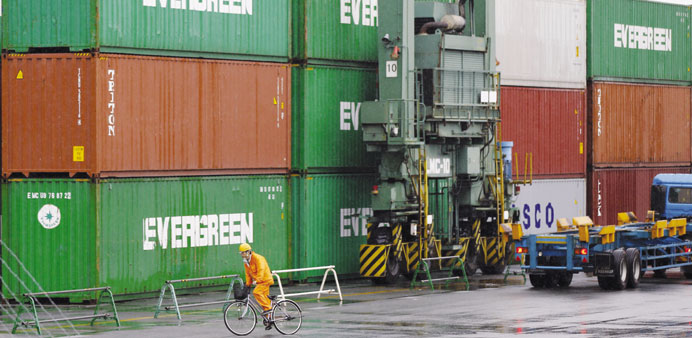A worker rides a bicycle in a container area at a port in Tokyo. Japanese exports slowed further in August, data showed yesterday.
AFP/Tokyo
Japanese exports slowed further in August, data showed yesterday, offering yet more evidence of global difficulties spurred by China’s stumbling economy.
The figures also highlight the challenge facing Prime Minister Shinzo Abe as he struggles to reignite growth and come a day after Standard & Poor’s cut Japan’s credit rating, saying the government had little chance of fixing underlying problems.
They will add to pressure on the country’s central bank to add more stimulus, despite the bank’s upbeat assessment this week.
The finance ministry said yesterday that exports rose 3.1% year-on-year to ¥5.88bn ($49bn) thanks to a rise in “automobiles and ships”. That was slower than the previous month and included a 4.6% tumble in shipments to China.
But Junko Nishioka, chief economist at Sumitomo Mitsui Bank, told AFP: “The weakness (in Japan’s exports) is not only coming from China, but also from the US and Europe.
“I think the third-quarter net trade data should add a negative contribution to growth, and bring headwinds for Prime Minister Shinzo Abe and the Bank of Japan.”
Exporters are not getting the boon they might be hoping for from the fall in the value of the yen, with weakness in China, a key driver of worldwide growth, and Europe the main concerns.
Abe has for more than two years pushed a huge spending blitz and monetary easing drive – called “Abenomics” – to inject life into the moribund economy and reverse almost two decades of deflation.
But he is struggling to make good on his pledges to cut red tape and open up the economy – a so-called third arrow of his plan – while inflation remains near zero and growth actually contracted in the second quarter.
Abe’s stewardship of the economy took a blow when Standard & Poor’s on Wednesday downgraded its sovereign credit rating on Japan, and took a swipe at the government.
“We believe that the government’s economic revival strategy – dubbed ‘Abenomics’ – will not be able to reverse this deterioration in the next two to three years,” S&P said.
“Economic support for Japan’s sovereign creditworthiness has continued to weaken in the past three to four years,” the agency said, pointing to “slow decision-making among policy institutions” as a particular issue.
The Bank of Japan held fire on expanding its ¥80tn annual asset-buying programme, saying the economy “has continued to recover moderately... exports and production are affected by the slowdown in emerging economies”.
However, many economists expect the bank to expand its already unprecedented easing measures.
Sumitomo Mitsui Bank’s Nishioka believes a widening of the stimulus programme was unlikely until the end of the year or early 2016, as BoJ governor Haruhiko Kuroda remains bullish about the economy.
“The BoJ may want to wait (to see) how much China and emerging economies are going to affect Japan’s economy,” she said.
Japan is the developed world’s most indebted country, with debt more than two times the size of its economic output.
The value of imports also dropped, slipping 3.1% to ¥6.45bn, which the finance ministry said was owing to lower global prices for crude oil and liquefied natural gas.
Research house Capital Economics forecast the fall would continue this month due to “the slump in crude oil prices in recent months and the renewed strengthening of the yen”.
Japan’s trade deficit fell 40% in August from a year earlier due to a slump in the cost of oil imports, finance ministry data showed yesterday, but exports sputtered due to waning appetite in China.
The deficit fell to ¥569.7bn ($4.73bn) compared to ¥953.2bn in August 2014, ministry data showed. That beat the ¥540.0bn predicted by survey of analysts of Bloomberg News.
The overall value of exports rose 3.1% compared to a year earlier to ¥5.88bn, due to a rise in “automobiles and ships”, finance ministry said in a statement. But they slowed from the previous month and shipments to major trade partner China fell 4.6% from a year earlier, prompting Capital Economics to warn exports could hinder Japan’s economic growth.
“Today’s trade data suggest that net exports continued to depress GDP growth this quarter,” the research house said.
The value of imports also dropped, slipping 3.1% to ¥6.45bn, which the finance ministry said was due to a slowdown in purchases of crude oil and liquefied natural gas.
Capital Economics forecast the fall would continue this month.
“The slump in crude oil prices in recent months and the renewed strengthening of the yen point to a further drop in petroleum imports in September,” the research house said.

